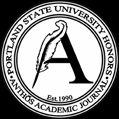Subjects
Comparative literature
Abstract
The act of observation, as defined by Professor Lawrence Wheeler’s Fall 2012 Syllabus for his course titled "Theatron", is "a morally complex act undertaken by qualified agents, operating through recognized and formalized practices, in a specific venue, and in possession of a carefully delimited vocabulary of discourse." Throughout many disciplines this formalized practice can be identified in many forms while still prescribing to this narrow definition. This essay will show how this definition of observation is applied to early 20th century American literature in Edith Wharton’s The Age of Innocence (1920) by examining the first chapter of Wharton’s museum cultured novel. Using the works of scholars interested in the American opera scene at the turn of the century and Wharton’s portrayal of New York’s elite, this essay will show how the first chapter’s opera scene specifically applies to Wheeler’s definition of observation.
DOI
10.15760/anthos.2013.33
Creative Commons License

This work is licensed under a Creative Commons Attribution-NonCommercial-Share Alike 4.0 International License.
Persistent Identifier
http://archives.pdx.edu/ds/psu/12585
Recommended Citation
Franke, Andréa René
(2013)
"Operatic Observation of the Audience: Examining Chapter One of Edith Wharton's The Age of Innocence,"
Anthós:
Vol. 5:
Iss.
1, Article 4.
https://doi.org/10.15760/anthos.2013.33
